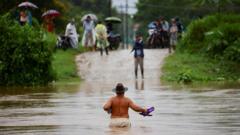Tropical Storm Sara has wreaked havoc in Honduras, severing access to over 1,700 communities due to relentless rainfall and subsequent flooding. The storm, which formed in the Caribbean Sea on Thursday, has resulted in widespread devastation, with Honduran officials confirming only one fatality thus far but indicating that more than 110,000 people have been affected.
The slow-moving storm dumped an extraordinary amount of rain, with isolated regions experiencing up to 500mm (19.7 inches), which caused numerous rivers to overflow. Consequently, many roads and bridges have become impassable, leading to the destruction of nine bridges and significant damage to another 19, as reported by Honduran emergency services.
In northern Honduras, the Bermejo River's swift currents caused one bridge in San Pedro Sula to be washed away entirely. Landslides along major highways have compounded the challenges faced by residents attempting to navigate the storm's aftermath.
Honduran President Xiomara Castro had alerted citizens residing near riverbanks to evacuate. Thousands responded by seeking safer shelters, a move that may have mitigated potential casualties. Nonetheless, reports indicate that over 2,500 homes have sustained damage, with more than 200 rendered uninhabitable.
Meteorologists expect Sara to weaken further as it progresses into the southern region of Quintana Roo in Mexico. The storm marks the 18th named storm of the Atlantic hurricane season and the third to emerge this month, following Hurricane Rafael, which previously caused a blackout across Cuba.
Experts warn that climate change, intensified by human activity, is contributing to the increasing severity and frequency of such storms. As noted by Kevin Trenberth, a distinguished scholar at the National Center for Atmospheric Research, while hurricanes naturally occur, their impact has been magnified due to rising sea surface temperatures.
As rescue crews conduct home-to-home assessments for stranded individuals, the situation remains urgent, with recovery efforts likely to take considerable time as the country grapples with the repercussions of this significant weather event.





















